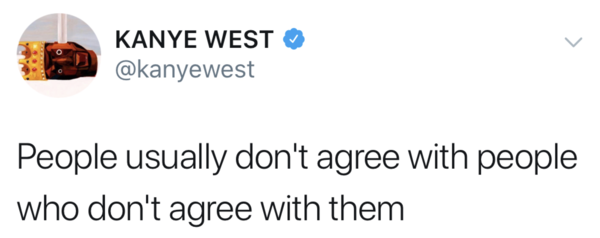🔥 Human face of technology #14

Tech
🎧 Spotify has gone public. The Swedish company has transformed the music market along with the ways we listen to and pay for music. The success of the model put forward by Spotify is beyond question. People want to pay a monthly subscription fee for the access to a massive music catalogue. With 70 million active subscribers – twice as much as Apple Music – Spotify remains the market leader. At the same time, Spotify generates losses. The company was $1.4bn in the red last year alone, and nothing suggests it might change anytime soon. The largest position in Spotify's expenditures is the music licensing – the major recording companies try to squeeze out as much as possible for the access to their catalogues. Spotify has used generous amounts of VC money to leverage their existence (nearly 3 billion dollars so far). Apart from paying for music licensing, Spotify is trying to build more leverage points using money: direct relationships with their consumers (just like any other aggregator), ecosystem integrations (e.g. Sonos devices), and state-of-the-art user experience created with the use of machine learning and social media elements. All of this makes the major recording companies consider Spotify as an important player. The streaming income makes them dependent, and promoting artists outside of Spotify is becoming impossible. On top of that, machine learning facilitates promoting more obscure items on the companies' catalogues, whose production costs haven't been redeemed so far. Spotify is also a useful partner in the negotiations with the giants (Apple, Amazon and Google all have a similar service on offer), who don't need to make a profit on streaming. Despite the losses generated, Spotify remains a company with great management and a coherent growth strategy. They might not make it, though. All it requires is for the music industry to decide to destroy the money-making machine for the sake of short-term gains.
💉 In 2015, the 31-year-old Elizabeth Holmes made it to the list of the youngest self-made billionaires, with her valuation estimated to be $4.5bn by Forbes. One year later, Forbes re-evaluated her worth "From $4.5 Billion to Nothing". Holmes founded Theranos, a startup that was supposed to revolutionise the blood test market with her invention. She managed to get $700m from investment funds and achieve a valuation of $9bn. What Theranos promised was impressive: the patient would only give 1 percent of blood that would otherwise be needed in conventional tests. Thus, the blood could be taken by pricking a finger instead of using a syringe. It would render such tests quicker and cheaper than the traditional methods. Unfortunately, Theranos's product doesn't work. On top of that, Holmes and her partner would inflate the company's financial results in the communication with investors – they would make out $100,000 in income to become $100,000,000. SEC accused Holmes and her partner of fraud, and, finally, a settlement was made – Holmes must pay a $500,000 penalty and will lose control over the company. The penalty seems meagre in comparison to the one Martin Shkreli was forced to pay. Shkreli was given $7.4m penalty and seven years in prison for about $10m in losses that he generated for the investors.
⌚️Vic Gundotry's (known for heading Google Plus) startup has produced Kardia Band, a strap for Apple Watch that enables Apple Watch to perform quick ECG tests. The ECGs will help patients with cardiovascular issues monitor the condition of their hearts in real time. This would, in turn, help to ingest better-adjusted doses of medicaments in case of atrial fibrillation. Gundotry's company, together with Mayo Clinic, has developed an algorithm that can detect hyperkalaemia (i.e. elevated levels of potassium) based on ECG results. Using 2 million ECGs and 4 million potassium test results, they trained their machine learning algorithms to detect hyperkalaemia with 90- to 94-percent precision.
🗂 Facebook doesn't collect our data without our consent ( usually), because we didn't have those data before Facebook. By using Facebook, we generate a lot of data on our behaviour. In turn, Facebook uses the data to create better products and sell ads. Without Facebook, these data would not exist. Facebook has built tools that actually created the data on our behaviour and our relationships with other. The Cambridge Analytica case showed that Facebook's problem didn't consist in collecting the data but rather in allowing third-parties to access them. We're OK with Facebook collecting/generating our data, but we aren't OK with them sharing the data with others.
Society
👽 "If the existence of extraterrestrial civilisations is so probable, why haven't we found even a trace of them yet?" This is what Fermi's paradox says, simplifying. Geoffrey Miller claims that 'fitness-faking technology' might explain the paradox. What's fitness-faking? It's our civilisation's drive for the virtualisation of our lives, motives, and efforts. It's much easier to play a game on the Xbox than do sports; it's easier to watch an episode of Friends than spend some time with actual friends; it's easier to watch a movie about space colonisation than to colonise space. Perhaps, extraterrestrial beings also prefer to play games than try and contact us?
👱♀️Why do people found companies? The typical answers to this question usually involve being your own boss, spotting an opportunity on the market, and a general propensity for entrepreneurship. According to a study ran by Asymmetric Information and Entrepreneurship, the real answer might be totally different. Entrepreneurs think that they have greater competencies than what their CVs say, and that they could earn more money if they worked on their own. This theory explains why so many immigrants found their own business (because their CVs don't let them find a good job), and why so many entrepreneurs declare they don't believe in formal education (they feel they will be more productive than the market would find them to be considering their education, because there's no way they could indicate their entrepreneurial skills).
👫 How do you depict the whole of humanity in a single picture? In 1972, NASA asked Carl Sagan to depict people on an aluminium plate send into space on Pioneer 10 and Pioneer 11 spaceships. Sagan's people look like Sagan – they have European facial features and 1970s haircuts. Wikipedia writers faced the same issue: choose a picture that would aptly illustrate the Wikipedia entry on humans. In the end, and after a hot debate, a picture of a couple from North Thailand was chosen.
Culture
🙈 The Instagram model @lilmiquela has over one million followers. It wouldn't be that strange but for the fact that lilmiquela doesn't really exist – she's the creation of a 3D/CGI artist, 100-percent computer-generated. Lilmiquela promotes clothing and beauty products, has her own political outlooks (progressive), and is engaged in a debate with @bermudaisbae, another digital Instagram model, who supports Trump. That's what the world looks like in 2018.
👉 National Geographic has admitted that their articles have been racist for quite a number of years. They would turn a blind eye to pressing social problems (e.g. apartheid in South Africa), they would depict the world through the eyes of the colonisers and show various communities as savages fascinated by the technologies brought by the white settlers.
Pic

.jpg?width=50&height=50&name=Kuba%201%20k%20(1).jpg)
.jpg?width=260&height=260&name=Kuba%201%20k%20(1).jpg)
